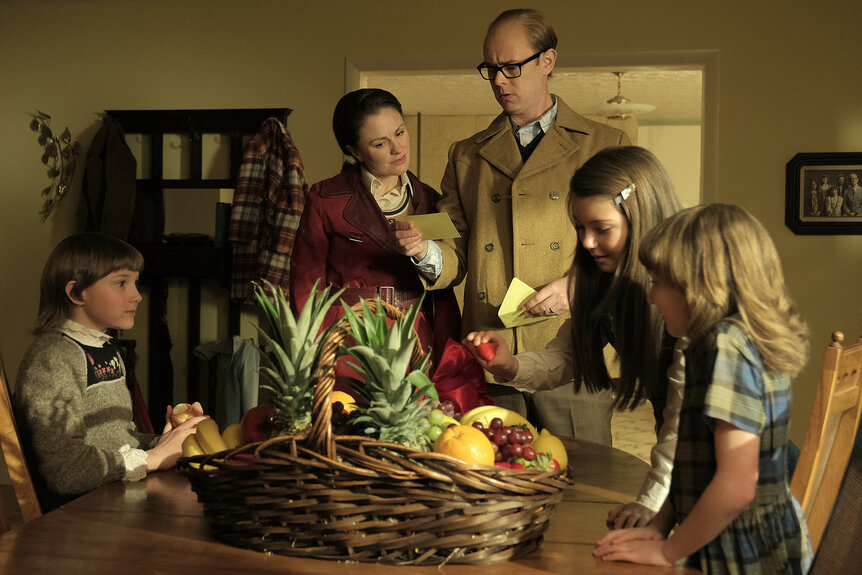Create a free profile to get unlimited access to exclusive videos, breaking news, sweepstakes, and more!
How Jan Broberg Was ‘Brainwashed’ By Her Abuser And What Parents Can Do To Prevent Similar Types Of Abuse
While parents often fear their children being abducted by a stranger, experts say it’s far more likely they could welcome an abuser through their front door.
For years, Jan Broberg believed she had been chosen for a valuable “mission.”
The 12-year-old allegedly had been convinced by close family friend Robert Berchtold, known as “Brother B” to the family, that she had been specially chosen to save an alien planet — and would only need to get pregnant by Berchtold to fulfill the mission.
Broberg learned of her supposed task after being kidnapped by Berchtold, who she has said drugged her while on the way to a horseback riding lesson. She woke up strapped to a bed as she faded in and out of consciousness and a voice coming from a small box in the room told her she had been identified as the chosen person to save their dying alien planet. Her “mission” involved getting impregnated by her “male companion” before she reached the age of 16 in order to give birth to a special child, according to The Idaho State Journal.
RELATED: Where Is Jan Broberg From Peacock's 'A Friend Of The Family' Now?
Broberg, one of three daughters born to Bob and Mary Ann Broberg in Pocatello, Idaho, was threatened that if she didn’t fulfill the mission, her father would be killed, one of her sisters would go blind and her other sister would be forced to take her place.
Even after Broberg was rescued weeks later by the FBI, she kept the “mission” secret and continued to see Berchtold — who spent just days behind bars for the first incident — to try to carry out the instructions. He kidnapped her a second time two years later.
The story — which is dramatized in Peacock’s new limited drama series “A Friend in The Family” — may sound fantastical, but experts say abusers are often well versed in manipulation and coercion strategies that keep child victims at their mercy.
“A lot of people, they think about these kinds of case of children being abused, or children going missing or things like that, and they think of like a gun and a mask and way, way more often what we see, the trend is a seduction abduction, where they are isolating them from reality, they’re isolating them from the people who love them, they’re isolating them from normalcy when they have to depend on this person for everything and then they are able to get that young person to do anything that they want,” Alison Feigh, Director of the Jacob Wetterling Resource Center, an organization devoted to stopping child abuse, told Oxygen.com.
According to Feigh, it’s important for the adults in a child’s life to be able to spot the warning signs of potential abuse to intervene and protect them from harm.
“If offenders are good at what they do, we have to be better,” she said.
The Brainwashing of Jan Broberg
In the years since her abductions, Broberg has described Berchtold as “brainwashing” her, telling ABC’s “The View” in 2019 that it “took 10 seconds” for her to believe the tale about aliens in 1974 because Berchtold had been laying the foundation to manipulate her for months, frequently mentioning alien sightings or news reports while the two families were spending time together and taking her and her sisters along with his own children to science fiction movies.
Berchtold had also become like a second father to the young 12-year-old after the two families had connected and started spending time together.
“This was someone, because he had engaged in sexual grooming, that she trusted very much,” Elizabeth Jeglic, a clinical psychologist and professor at John Jay College of Criminal Justice, explained to Oxygen.com. “He was a part of their family. She had no reason to doubt him. When this happened and then he talked about aliens she had no reason not to think it was going on.”
Broberg’s young age also made her a more susceptible target for believing the far-fetched story.
“If you think about children at that age they still have a pretty active fantasy life,” Jeglic said.
A 2021 study published by the British Psychological Society found that adolescents are often ripe for believing conspiracy theories, noting that the thinking “appears to be heightened” at the age of 14.
Research from Boston University has also suggested that children exposed to religion have a more difficult time distinguishing between fiction and reality in fantastical stories — an idea that Broberg referenced herself in the 2019 interview on “The View.”
For her entire life, she had grown up believing the “Mary, Jesus and Joseph” story that serves as a backbone of Christianity. Berchtold’s story about aliens desperate to save their own planet picked up on a lot of the same themes.
“I was this special person that was going to have this special child that was going to save the world,” she said. “That’s a story I heard at Christmas time.”
Jeglic described Broberg’s case as “a product somewhat of the time” because of the lack of outside information the pre-teen had to investigate his claims.
“We did not have internet. We only watched, you know, the local news on tv. There wasn’t a lot of information outside of your family or friends and so children didn’t have ways to verify things independently, but we’re taught to trust adults and he was a very trusted member of her family (and) he was somebody who provided her with a lot of positive reinforcement,” she said.
As Linda Bortell, a psychologist specializing in child trauma, explained, when a child is in danger the logical part of their brain also often shuts off.
“The primitive part of their brain is the thing that kicks on and so, it’s that amygdala that’s working and it’s all about immediate survival and kids will do whatever they can to survive and a lot of times its to be passive,” she said.
Common Tactics Used By Abusers
While Jeglic described Broberg’s case as somewhat atypical and an “extreme example” of grooming or manipulation due to the incredible lengths Berchtold was willing to go through, both with Broberg herself and her family to pull off the years-long ruse, there are some common threads that other abusers have used to manipulate and abuse children.
Experts say abusers often begin by looking for a vulnerable target.
“That could be just because the parents are busy. It could be because they have a lot of siblings and they kind of get lost in that,” said Eliana Gil, a therapist who has worked in sex abuse prevention and treatment since 1973.
Child sex abusers also may target someone who lives in a community where families don’t talk about boundaries and bodies and anatomy aren’t openly discussed in the family.
“An offender is looking for someone who doesn’t know about their bodies, doesn’t know about boundaries, doesn't know about what is healthy,” Feigh said. “They then get to define what is healthy for that child and we’re not going like how they define it.”
After identifying a child’s vulnerability, offenders work hard to fill that need, often through paying special attention to the child, making them feel like they are the most important thing in the world or giving them expensive gifts.
“It’s a complex manipulation and it’s based on getting the child to have complete trust in you and to believe, in fact, that you are there just for them,” Gil said. “They want to become the most important person for the child and the child ends up feeling like they are that person’s most important person.”
Much like in Broberg’s story, that manipulation often extends to the child’s family, who have also extended trust to the offender.
According to data from the National Sexual Assault Hotline, 93% of the child sexual abuse victims who reported their abuse to law enforcement knew their abuser. Of that, 59% were considered acquaintances of the child or family.
As part of the grooming process, offenders often isolate their victims by working to discredit others around them, even if it means distorting a child’s reality. While these distortions don’t typically involve alien abductions, offenders can convince children their parents don’t care about them, they are the only one who truly understands a child, or get them to believe that the happiness or safety of others around them relies on their silence.
“Offenders work very hard to find vulnerable targets and then they try to make the child feel like they are part of the plot,” Feigh said. “If they can make them feel like the kid is part of the plot, the child is going to be less likely to say something.”
Abusers also often rely on threatening their victims, whether it’s with something as simple as telling a child that their mother or father will be unhappy if they tell, or something as extreme as threatening physical violence or harm to their family members.
“They kind of convince the kids that the kids are saving the family, that they are protecting the family and that this secret is the only thing that is really important and worthwhile in their lives and it’s very common,” Gil said. “You see parents do it, you see non-parents do it. I’ve had so many little kids that they’re just scared to death.”
What Parents Can Do To Combat Abuse
To prevent your child from being sexually abused or manipulated by others, experts say one of the first things parents need to do is educate themselves about common warning signs and what to look for.
“I think the important thing is really having these open lines of communication, recognizing what sexual grooming is and some of the behaviors and tactics of it and just talking to children (and) educators,” Jeglic said. “The more we know about what a perpetrator does the more we are likely to identify it before any harm comes to the child.”
Experts also believe parents should openly talk to their children about what kind of touches are safe and what kind of things a parent or other trusted adult would need to know about.
“With little ones, we can say ‘In our family we talk about touches. Touches are never secret,’” Feigh said. “So if you meet someone who doesn’t want to talk about touches, who wants to touch you and doesn’t want to tell anybody, that’s a big problem.”
She recommends parents help their child create a safety network of five trusted adults who the child can go to anytime they have any concerns. It is particularly important to have multiple people in a child’s safety net in case one of those people trusted by the family is the perpetrator, she said.
According to Feigh, it’s also important that the child knows if someone ever violates a safety rule, it would never be the child’s fault and no one would be mad at them for telling what happened.
Gil said another “tip-off” is anyone who is paying too much attention to your child or trying to get them alone.
“What I would say to parents is anyone who is spending special attention, special time with your kid, is giving them gifts, is wanting them to spend time with them either alone or in activities that are away, to just be cautious, go with them, don’t let them go alone,” Gil said. “Make sure you know who that is, make sure you know what’s going on (and) what the activities are.”
A sudden change in a child’s behavior, whether it’s a change in their personality, sleeping habits or eating habits, is another sign that a child may be under stress.
Experts say the important thing is letting children know that no matter what has already happened, no one is going to be mad at them and that parents are there to help their children work through their problems, whatever that may be.































